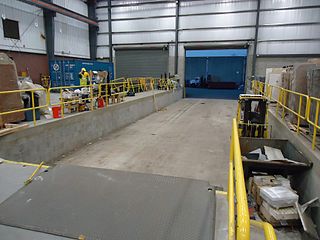
In commerce, supply chain management (SCM) deals with a system of procurement, operations management, logistics and marketing channels, through which raw materials can be developed into finished products and delivered to their end customers. A more narrow definition of supply chain management is the "design, planning, execution, control, and monitoring of supply chain activities with the objective of creating net value, building a competitive infrastructure, leveraging worldwide logistics, synchronising supply with demand and measuring performance globally". This can include the movement and storage of raw materials, work-in-process inventory, finished goods, and end to end order fulfilment from the point of origin to the point of consumption. Interconnected, interrelated or interlinked networks, channels and node businesses combine in the provision of products and services required by end customers in a supply chain.

Logistics is the part of supply chain management that deals with the efficient forward and reverse flow of goods, services, and related information from the point of origin to the point of consumption according to the needs of customers. Logistics management is a component that holds the supply chain together. The resources managed in logistics may include tangible goods such as materials, equipment, and supplies, as well as food and other consumable items.
Logistics engineering is a field of engineering dedicated to the scientific organization of the purchase, transport, storage, distribution, and warehousing of materials and finished goods. Logistics engineering is a complex science that considers trade-offs in component/system design, repair capability, training, spares inventory, demand history, storage and distribution points, transportation methods, etc., to ensure the "thing" is where it's needed, when it's needed, and operating the way it's needed all at an acceptable cost.

A supply chain, sometimes expressed as a "supply-chain", is a complex logistics system that consists of facilities that convert raw materials into finished products and distribute them to end consumers or end customers. Meanwhile, supply chain management deals with the flow of goods within the supply chain in the most efficient manner.
A value chain is a progression of activities that a business or firm performs in order to deliver goods and services of value to an end customer. The concept comes from the field of business management and was first described by Michael Porter in his 1985 best-seller, Competitive Advantage: Creating and Sustaining Superior Performance.
The idea of [Porter's Value Chain] is based on the process view of organizations, the idea of seeing a manufacturing organization as a system, made up of subsystems each with inputs, transformation processes and outputs. Inputs, transformation processes, and outputs involve the acquisition and consumption of resources – money, labour, materials, equipment, buildings, land, administration and management. How value chain activities are carried out determines costs and affects profits.
Information Logistics (IL) deals with the flow of information between human and / or machine actors within or between any number of organizations that in turn form a value creating network. IL is closely related to information management, information operations and information technology.
The term demand chain has been used in a business and management context as contrasting terminology alongside, or in place of, "supply chain". Madhani suggests that the demand chain "comprises all the demand processes necessary to understand, create, and stimulate customer demand". Cranfield School of Management academic Martin Christopher has suggested that "ideally the supply chain should become a demand chain", explaining that ideally all product logistics and processing should occur "in response to a known customer requirement".
Supply chain security activities aim to enhance the security of the supply chain or value chain, the transport and logistics systems for the world's cargo and to "facilitate legitimate trade". Their objective is to combine traditional practices of supply-chain management with the security requirements driven by threats such as terrorism, piracy, and theft. A healthy and robust supply chain absent from security threats requires safeguarding against disturbances at all levels such as facilities, information flow, transportation of goods, and so on. A secure supply chain is critical for organizational performance.
Supply-chain optimization (SCO) aims to ensure the optimal operation of a manufacturing and distribution supply chain. This includes the optimal placement of inventory within the supply chain, minimizing operating costs including manufacturing costs, transportation costs, and distribution costs. Optimization often involves the application of mathematical modelling techniques using computer software. It is often considered to be part of supply chain engineering, although the latter is mainly focused on mathematical modelling approaches, whereas supply chain optimization can also be undertaken using qualitative, management based approaches.
Infor Nexus is an independent business unit of Infor LLC offering a multienterprise supply chain network. The on-demand global supply chain management platform and integrated applications are used worldwide by businesses to manage global direct procurement, supplier networks, global logistics and global trade processes. Founded in 1998, in Oakland, California, it merged with TradeCard in 2013, and in September 2015, GT Nexus was acquired by Infor. Today, Infor Nexus is a business unit of Infor.

A supply-chain network (SCN) is an evolution of the basic supply chain. Due to rapid technological advancement, organizations with a basic supply chain can develop this chain into a more complex structure involving a higher level of interdependence and connectivity between more organizations, this constitutes a supply-chain network.

Transport Corporation of India Limited is an Indian logistics and supply chain management company headquartered in Gurugram, Haryana, India. It was founded in 1958 by Prabhu Dayal Agarwal at Kolkata, India.
Petrolsoft Corporation (1989–2000) was a supply chain management software company with a focus on the petroleum industry. Petrolsoft Corporation was founded at Stanford University in 1989 by Bill Miller and David Gamboa as Petrolsoft Software Group. It was later incorporated in 1992. Petrolsoft introduced demand-driven inventory management to the petroleum industry.
Sustainable distribution refers to any means of transportation / hauling of goods between vendor and purchaser with lowest possible impact on the ecological and social environment, and includes the whole distribution process from storage, order processing and picking, packaging, improved vehicle loadings, delivery to the customer or purchaser and taking back packaging.
Third-party logistics is an organization's long term commitment of outsourcing its distribution services to third-party logistics businesses.
Inventory optimization refers to the techniques used by businesses to improve their oversight, control and management of inventory size and location across their extended supply network. It has been observed within operations research that "every company has the challenge of matching its supply volume to customer demand. How well the company manages this challenge has a major impact on its profitability."
SolveIT Software Pty Ltd is a provider of advanced planning and scheduling enterprise software for supply and demand optimisation and predictive modelling. Based in Adelaide, South Australia, 70% of its turnover is generated from software deployed in the mining and bulk material handling sectors.

Iptor Supply Chain Systems, formerly International Business Systems (IBS), is a supply chain management company that provides professional services and enterprise resource management software for distributors and wholesalers, with its headquarters in Stockholm, Sweden. They were previously publicly traded on the Stockholm Stock Exchange and have offices in several countries. They are rated by AMR Research and Frost & Sullivan as the largest supply chain execution solutions company by revenue.
The Descartes Systems Group Inc. is a Canadian multinational technology company specializing in logistics software, supply chain management software, and cloud-based services for logistics businesses.
In commerce, global supply-chain management is defined as the distribution of goods and services throughout a trans-national companies' global network to maximize profit and minimize waste. Essentially, global supply chain-management is the same as supply-chain management, but it focuses on companies and organizations that are trans-national.






